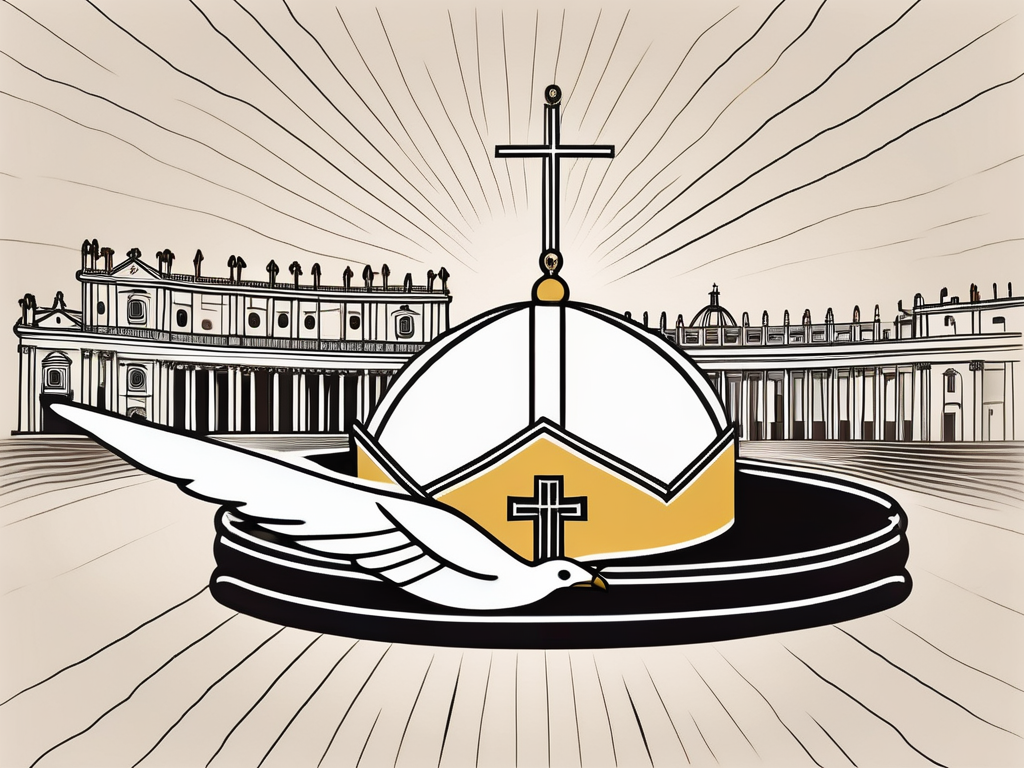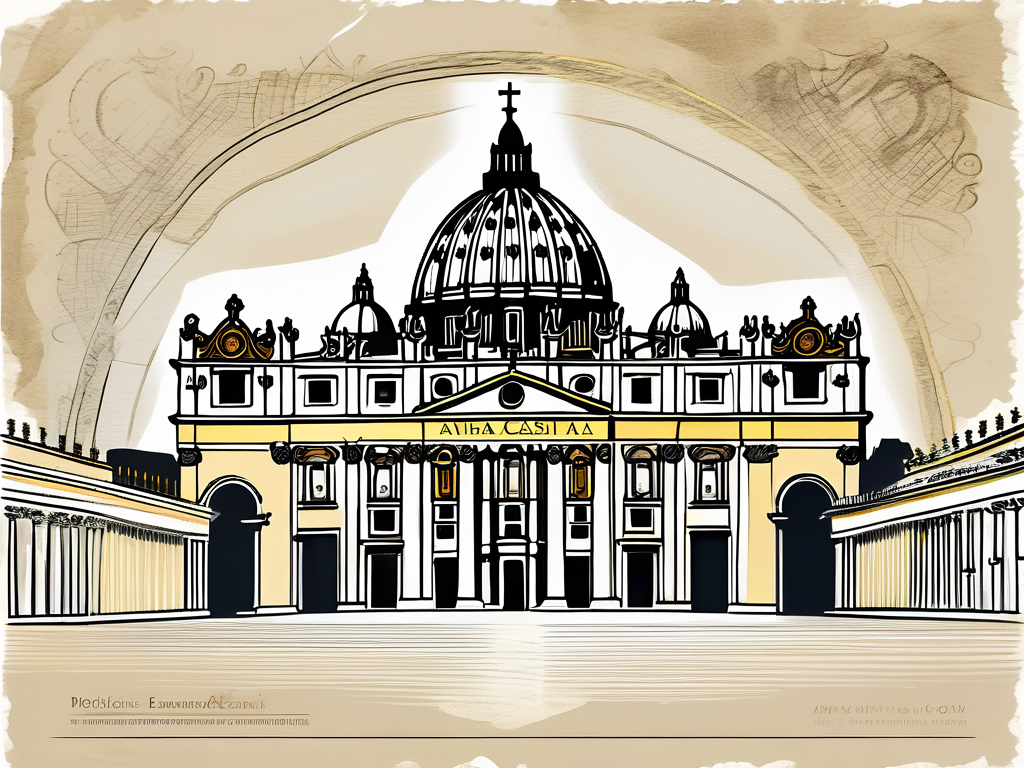Saint Ambrose of Milan was a prominent figure in the early Christian Church, known for his significant contributions to theology, as well as his influence on Roman emperors and the imperial policies of his time. Born into a noble family, Ambrose’s life was marked by a series of unexpected events and remarkable achievements.
Early Life and Education of Saint Ambrose
Let’s dive into Ambrose’s early years. Born into a Christian family in the year 340, Ambrose grew up in the great city of Rome. His family background provided him with a solid foundation of faith. However, his journey towards becoming a renowned bishop had its fair share of twists and turns.
Birth and Family Background
Ambrose’s birth brought immense joy to his family. His father, Aurelius Ambrosius, was a prominent Roman citizen and the governor of the region. From a young age, Ambrose was exposed to a world of privilege and influence.
But it wasn’t just his noble lineage that shaped him. Ambrose’s mother, a devout Christian, instilled in him the values of love, compassion, and devotion to God. This early spiritual upbringing would prove crucial in shaping Ambrose’s path in life.
As a child, Ambrose often accompanied his father on official duties, witnessing firsthand the intricacies of governance and the challenges faced by the Roman Empire. These experiences sparked his curiosity and nurtured his desire to make a positive impact on society.
Intellectual Pursuits and Influences
In his pursuit of knowledge, Ambrose honed his skills in rhetoric and philosophy. He studied in Athens, where he came into contact with various intellectual currents of the time. These influences played a significant role in shaping his theological beliefs and his ability to engage in profound debates.
During his time in Athens, Ambrose immersed himself in the teachings of renowned philosophers such as Plato and Aristotle. Their philosophies, coupled with his Christian upbringing, sparked a deep intellectual curiosity within him. Ambrose sought to reconcile the wisdom of ancient philosophers with the teachings of Christianity, blending reason and faith in his pursuit of truth.
Upon returning to Rome, Ambrose embarked on a career in law and politics, following in his father’s footsteps. Little did he know that his life was about to take a drastic turn.
As a lawyer, Ambrose quickly gained recognition for his sharp intellect and persuasive oratory skills. His reputation as a skilled advocate spread throughout the city, attracting the attention of influential figures in Roman society. Despite his success in the legal profession, Ambrose felt a growing sense of emptiness and yearned for a deeper purpose in life.
It was during this period of introspection that Ambrose encountered a life-changing event. The bishop of Milan, a city in northern Italy, had passed away, leaving a vacancy in the position. The appointment of a new bishop required the consensus of both the clergy and the people. In an unexpected turn of events, Ambrose found himself caught in the midst of a contentious dispute over the selection of the new bishop.
Ascension to Bishopric
Life is full of surprises, and Ambrose’s path to becoming a bishop was no exception. What started as an unexpected turn of events transformed him into one of the most influential figures of his time.
The Unexpected Election
In a twist of fate, Ambrose was catapulted into the role of Bishop of Milan. The local clergy and the people of Milan recognized his exceptional moral character and theological expertise, unanimously electing him to the position. Despite his initial reluctance to accept the responsibility, Ambrose finally yielded to the will of the people.
This sudden change in Ambrose’s life led him to commit himself fully to the service of the Church and its followers. His episcopal journey had begun.
Ambrose’s Ecclesiastical Contributions
As bishop, Ambrose dedicated himself to the spiritual well-being of his flock. He emphasized the importance of liturgy and the sacraments, encouraging the participation of all believers. Ambrose’s commitment to the Church was also evident in his efforts to promote social justice and support those in need.
Furthermore, he played a significant role in fostering unity within the Church and addressing doctrinal disputes through his eloquent writings and persuasive sermons.
Ambrose’s impact extended beyond the boundaries of Milan. His reputation as a wise and compassionate bishop attracted the attention of other influential figures of the time. Many sought his counsel and guidance, recognizing his deep understanding of theology and his ability to provide spiritual guidance.
Throughout his tenure as bishop, Ambrose tirelessly worked to strengthen the Church and its teachings. He established schools and seminaries to educate future clergy, ensuring a well-prepared and knowledgeable generation of leaders. His commitment to education and intellectual growth was instrumental in shaping the future of the Church.
Ambrose’s influence was not limited to the spiritual realm. He actively engaged with political leaders, advocating for justice and fairness. His fearless stance against the abuse of power and his unwavering commitment to truth earned him the respect and admiration of many, even those outside the Church.
Under Ambrose’s leadership, the diocese of Milan flourished. Churches were built, and the faithful flocked to hear his sermons, which were known for their eloquence and profound insights. His teachings resonated with people from all walks of life, inspiring them to lead virtuous lives and seek a deeper connection with God.
Ambrose’s legacy continued long after his death. His writings, including theological treatises and hymns, have been widely studied and cherished by scholars and believers alike. His contributions to the development of Christian doctrine and the establishment of the Church’s authority have left an indelible mark on history.
Today, Ambrose is remembered as a saint and a doctor of the Church. His life serves as a testament to the power of faith, humility, and dedication. Ambrose’s ascension to the bishopric may have been unexpected, but it was undoubtedly a divine appointment that shaped the course of Christianity.
Saint Ambrose’s Theological Impact
Ambrose’s theological influence reverberated far beyond the borders of Milan. He played a crucial role in addressing the Arian controversy, a heated theological debate that had stirred division within the Church.
Saint Ambrose, the Bishop of Milan in the 4th century, was a towering figure in the early Christian Church. His impact on theology and doctrine cannot be overstated. One of the most significant contributions he made was his role in the Arian controversy.
His Role in Arian Controversy
As a staunch defender of Orthodox Christianity, Ambrose fearlessly stood against the teachings of Arianism. Arianism, named after the priest Arius, claimed that Jesus Christ was not fully divine but rather a created being. This belief threatened the very core of Christian doctrine, challenging the belief in the Holy Trinity and the divinity of Christ.
Ambrose, with his unwavering commitment to the truth, eloquently articulated the belief in the full divinity of Christ. His powerful sermons and writings resonated with the faithful, earning him the respect and admiration of his contemporaries. Ambrose’s theological prowess and persuasive arguments played a pivotal role in refuting the Arian heresy and restoring unity within the Church.
His influence extended far beyond the city of Milan. Ambrose’s reputation as a defender of Orthodox Christianity spread throughout the Roman Empire, inspiring countless believers to stand firm in their faith.
Influence on Christian Doctrine
Ambrose’s theological contributions extended beyond the resolution of specific controversies. His writings laid the groundwork for fundamental Christian doctrines and shaped the development of theology for generations to come.
One of the key areas where Ambrose made a lasting impact was in the understanding of the Holy Spirit. He emphasized the role of the Holy Spirit as the third person of the Trinity, equal in divinity with the Father and the Son. Ambrose’s teachings on the Holy Spirit greatly influenced the formulation of the Nicene Creed, which remains one of the most important statements of Christian faith.
Furthermore, Ambrose’s writings on the sacraments, particularly baptism and the Eucharist, provided a solid theological foundation for the Church’s understanding of these sacraments. His insights into the mystical nature of these sacred rituals continue to shape the liturgical practices of Christians worldwide.
Ambrose’s teachings continue to inspire and guide believers to this day. His emphasis on the importance of Scripture, his defense of Orthodox Christianity, and his unwavering commitment to the truth serve as a timeless example for all Christians.
Ambrose’s Relationship with Roman Emperors
Ambrose’s influence was not limited to the spiritual realm. His remarkable rapport with Roman emperors brought about significant changes in both Church and state.
Interactions with Emperor Theodosius
One of Ambrose’s most noteworthy relationships was with Emperor Theodosius. When Theodosius committed a grave act of violence, Ambrose fearlessly excommunicated the powerful emperor, emphasizing the importance of repentance and accountability for all, regardless of station or power.
This bold act demonstrated Ambrose’s unwavering commitment to justice and the principles of the Christian faith, leaving an indelible mark on the relationship between Church and state.
Influence on Imperial Policies
Ambrose’s influence extended beyond personal relationships. His counsel and wisdom guided emperors in the formulation of policies that aligned with Christian principles, promoting fairness, compassion, and the protection of the vulnerable. Through his interaction with Roman emperors, Ambrose played a crucial role in shaping the moral landscape of the Empire.
Literary Contributions of Saint Ambrose
Ambrose was not only a celebrated bishop and theologian, but also a prolific writer. His literary legacy encompasses a wide range of works, demonstrating his diverse talents and deep insights.
Hymns and Sermons
Ambrose’s hymns and sermons showcased his ability to captivate audiences through the power of words. His hymns, characterized by their lyrical beauty and profound theological depth, continue to be revered as some of the finest pieces of Christian liturgy.
His sermons, delivered with eloquence and conviction, resonated with listeners and contributed to the spiritual growth of the Christian community. Ambrose’s words touched hearts and souls, leaving a lasting impact on all who heard them.
Theological and Philosophical Writings
In addition to his homilies, Ambrose left behind a rich collection of theological and philosophical writings. His works covered a wide range of topics, from morality and ethics to the nature of God and the Church. Ambrose’s writings continue to shape theological discourse and inform contemporary discussions.
In Conclusion
Saint Ambrose of Milan’s life was one filled with remarkable achievements and profound influence. From his early years marked by unexpected turns, to his ascension to the Bishopric of Milan, Ambrose’s legacy shines as a beacon of faith, courage, and intellectual rigor.
His theological impact, fearless defense of orthodoxy, and influential relationships with Roman emperors all contributed to shaping the landscape of both Church and state. And through his hymns, sermons, and writings, Ambrose continues to inspire and guide believers around the world, cementing his place as a revered figure in Christian history.












